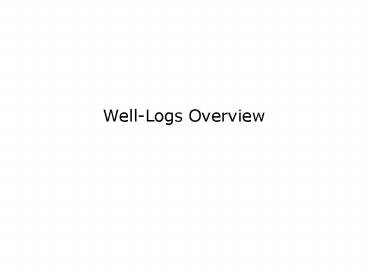WellLogs Overview - PowerPoint PPT Presentation
1 / 22
Title:
WellLogs Overview
Description:
Tool Type (Full Name) 3. Hard to find up to date information in public domain. Public Access ... future consistency and availability of the Practical Well ... – PowerPoint PPT presentation
Number of Views:84
Avg rating:3.0/5.0
Title: WellLogs Overview
1
Well-Logs Overview
2
Practical Well-Log Standards(PWLS)
Objective To create a single, easily accessible
source for practical well-log standards
3
Practical Well-Log Standards(PWLS)
The project set out to address a number of
practical business needs, primarily information
overload and complex naming conventions
- Phase 1 completed in December 2000
- Delivered standards for around 60 new
technology logging tools - Presented as sets of curve attributes (including
tool assignments) - Basic web delivery system
- Phase 2 proposals are being developed
- Meetings held in London and Houston Q1/2001
- Work plan being developed
4
Well Logs Business Issues
- 1. Huge numbers of curves (information overload)
- Most oil company customers only load a small
sub-set of - curves into their data stores
- 2. Complex naming at BOTH Curve and Tool level
- Even petrophysicists are confused
- Others got lost years ago!
- 3. Hard to find up to date information in public
domain - Isolated lists, complex language (POSC)
Must recognise differences between expert
(petrophysicist) and genaralist users
5
1. Huge numbers of curves(information overload)
6
Information Overload
- Business Value
- Real Business Value is concentrated in a
relatively small number of data curves - filtered
views allow focus on high value data
Data Overload!
7
Information Overload - Business Value
Note Business Value does not take account of
usage. It deals with the average case
Load Frequency
High Business Value Most oil company customers
only load a small sub-set of curves into their
data stores
Most Commonly Loaded
Medium Business Value Loaded for specialist
applications
Rarely Loaded
Load Curve Names
8
Business Value - issues
- Business Value allows a context view on curve
data sets - There are different implementation options, for
example - Load only High Business value to Corporate and
keep original tape images with simple index - Load High and Medium, use Business Value as a
view filter. Default view is High value. Keep
original tape images with simple index - Business Value may change with time, particularly
for new tools - It is easier to change views than re-load
9
2. Complex naming at Curve and Tool level
10
Naming Complexity
- Historical
- Relatively small number of curves
- 4-letter names (luckily!)
- Alphabet-soup
- Unrecognisable names
- Today
- Huge number of curves (use Business Value)
- Databases allow curve attributes
- but may cause problems with legacy apps
- Objective
- must SIMPLIFY VIEW of data
11
Naming Complexity
- LOG/Tool Names
- GRAND SLAM
- DSI Vs DSST Vs SDT?
- PEX (HALS)
- HALS, HDLL, HDIL, HGNS, HNGS, HRDD, HRGD
- PROC1
- DAVE21
- 22MAY97
- COMP
- GEOL
- CURVE Names
- Sonics DT1R, DT4P, DT4S, DT5, DTCR, DTMN, DTRP,
DTSD, DTSM, DTHC, DTHU - Densities RHOZ, NRHB, RHOM, HNRH, HRHO, RHOB,
HDEB, HROM - 712, 7121, 7122
- All Sonics DT, Densities RHOB
- GR_ED_001_AJB
LOG refers to a collection of curves for
example from a logging acquisition or
interpretation process
12
Naming Complexity
- Curves
- Generic classifications can help users select
from a small sub-set of available curves. For
example, inquiries for density curves returns
only relevant curve names - For simple, generalist curve sets standard curve
names could be devised (Phase 2 proposal)
13
Curve Generic Classifications
RHOB
ZDEN
Density
DRHO
Density Correction
DT
Density
Acoustic
AC
Acoustic
Individual Travel Time
ITT
Resistivity
Deep Resistivity
TT3
Micro Resistivity
RD
ILD
MLL
Generic Classification
Specific Name
Measurement
14
Naming Complexity
- Tools
- Generic tool names to help non-experts (probably
full names rather than mnemonics). Particularly
useful for non-standard tools like
dipmeter/image, production or formation pressures.
15
Generic Tool AttributesExamples
Tool Type (Full Name)
Tool Type (Mnemonic)
16
3. Hard to find up to date information in public
domain
17
Public Access
- Websites
- Common access point for standard information
- Currently accessible on POSC and SPWLA websites,
PPDM being discussed - Websites being set up for different user
requirements, e.g. - Developers download entire database
- Users ad-hoc inquiries
18
Must recognise differences between expert
(petrophysicist) and generalist users
19
User Groups
- Specialists
- Users who are familiar with the domain language,
like petrophysicists. The standards help reduce
overload issues by allowing context views and
giving full information at curve level (e.g.
Curve Description) - Generalists
- Users who are often customers of the specialists
but who are unfamiliar with the domain language.
Generic tool-level names are appropriate (Phase
1) or standards for simpler data sets (Phase 2
proposals)
20
Next Steps
21
Phase 2 Proposals
- Meetings in London (30-Jan) and Houston (15-Feb)
to discuss Phase 2 proposals - Follow-up voting highlighted the following areas
- Website and Communications advertise current
work and develop website access - Maintenance develop processes to ensure future
consistency and availability of the Practical
Well-log Standards - Additional classifications for example
- complete new tools
- add older tools
- simple composite (joined) or interpreted curves
(for generalist usage)
22
Phase 2 Proposals
- Next steps
- Agree work programme
- Seek sponsorship
- If sponsorship is forthcoming, carry out
prioritised work































